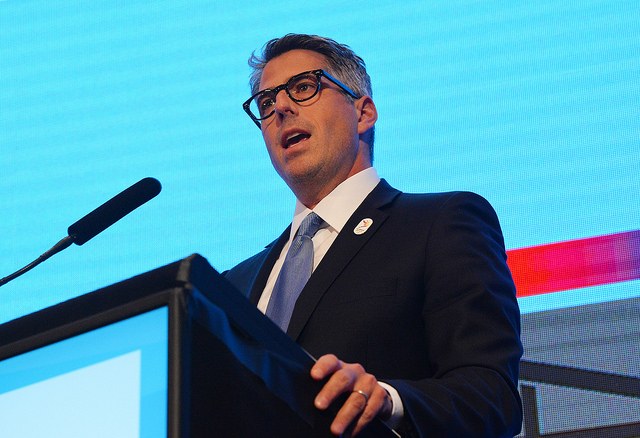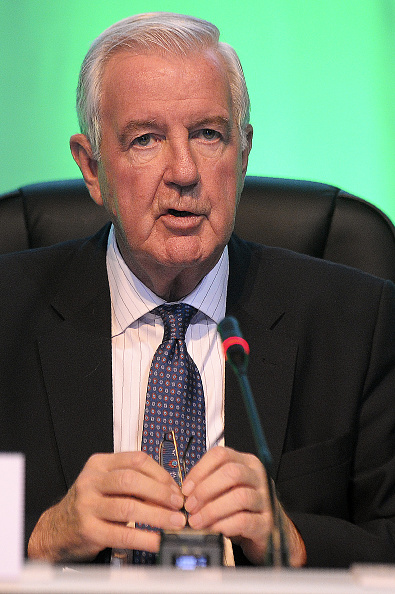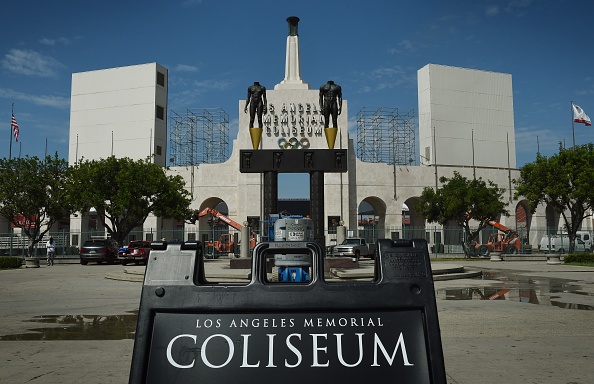The choice the International Olympic Committee is facing for the 2024 Summer Games, even as it considers a 2024/2028 deal between Los Angeles and Paris, could not be more clear.
More of the same. Or something new.
Or framing it another way: Paris is after a Games. Los Angeles is offering itself in service to the Olympic movement.
Both cities made 10-minute presentations Tuesday to a convention of international sports federation officials in Denmark.
In the LA spot, mayor Eric Garcetti said, “Many believe that the bids ... are quite similar when in fact the two bids that we have presented before us are quite different,” a distinction that even in 10 short minutes times two became crystal clear.
Paris bid co-chair Tony Estanguet, to the audience: “We are promising a Games of real passion and purpose …” Anne Hidalgo, the mayor: “So why Paris now?” She answered a moment later: “We believe we have the right city with the right vision at exactly the right moment for sport.” Paris bid chief executive Etienne Thobois: “We will deliver the best Games ever for the athletes based on three key pillars,” among them a “brand-new [athletes’] village.”
LA strategy director Angela Ruggiero, the IOC athletes’ commission chair: “Our commitment to you isn’t just for the 16 days of the Games in 2024. It is for the seven years leading up to them, and beyond.” LA bid leader Casey Wasserman: “I think we can all agree that 2024 must be a transformative Games for the movement. This means that the next seven years must inform the next 100 years.”
To springboard off the two radically different presentations Tuesday in Denmark:
At issue is way more than 2024 (or 2028). It is nothing less than the ongoing relevance and vitality of the entire Olympic movement.
This is not hyperbole. It is not drama. It is not Chicken Little sky-is-falling talk.
This is real, and the leadership of the IOC as well as most of the members, who in theory ought to be up to speed on the potentially existential crisis the movement is even now confronting but in some instances might well be a little slow on the uptake, had better sharpen their focus, and quickly.
It’s this elemental:
IOC leaders and members act as stewards of the brand and the movement. An Olympic Games is a multibillion-dollar enterprise. In the bid context, the role demands world-class risk assessment. The old days of cronyism and I’ll-scratch-your-back, you-scratch-mine — that, with the FBI as well as the French and Swiss authorities watching with interest, has to be yesteryear. In a related spirit, there can be no place for sweet but misguided sentimentality. To exercise anything but cold, hard judgment, particularly now, when the brand and movement are considerably imperiled, is to be irresponsible, almost to the extreme.
Imperiled? Unequivocally. Evidence, just the latest:
The Tuesday presentations from both LA and Paris followed Monday’s announcement from the National Hockey League that it was out of the PyeongChang 2018 Winter Games.
Bottom line: the league is willing to forgo the best two-week commercial the sport of hockey could ask for, and this with Beijing 2022 and China and the possibility of a market of some 2 billion consumers just waiting to be mined four years down the line.
Irrefutable conclusion: the league doesn’t think the Olympics are worth it. In its considered judgment, after being part of the thing since 1998, the Olympics are no longer relevant, or at least relevant enough.
That is a brutal blow to the IOC. No way to sugarcoat it. It is, to use a phrase, a nightmare on ice.
A comparison:
Would Manchester United stop its season for the FIFA World Cup?
Yes, yes, FIFA is in business to make money, the IOC is theoretically in it to help spread the values of friendship, excellence and respect, among others. But still — Man U and the other English Premier League teams are going to make it work out to go to Qatar in 2022 but per the NHL the Columbus Blue Jackets can’t, or won’t, put things on hold to send some guys to PyeongChang in 2018?
Starting from that premise, that the Olympic enterprise is not relevant (enough) for the league that for a generation has supplied the guys in the most important team sport on the Winter Games program, the IOC finds itself looking at just two cities left in the race for 2024.
When three cities have already fallen away: Rome, Budapest and Hamburg.
When the 2022 Winter Games campaign saw just two left standing by the end — Beijing and Almaty, Kazakhstan — with five other western European cities pulling out along the way because taxpayers or officials would have nothing to do with it: Oslo, Munich, Stockholm, Davos/St. Moritz and Krakow.
This is the moment of clarity.
The old model, the more of the same, is the one in which bid committees don’t tell the truth about the costs of their government-funded Olympic bids.
Examples:
Rio 2016, bid book $14.4 billion, reality check $20 billion or more. Tokyo 2020 bid book $7.8 billion, now estimated at maybe $15 billion, possibly $25-30 billion. Sochi 2014, bid book we won’t even go there, final tally a reported $51 billion.
Paris 2024 is more of this same.
The Paris people say they have 95 percent of their venues built. It’s the 5 percent that aren’t that mark the big-ticket items: that athletes’ village along with media housing and an aquatics complex. The Paris bid book costs those out at over $2 billion.
History says that $2-billion figure would be way low. It’s almost a guarantee, actually.
If there is one thing we have learned in this social media age, it is this:
Even those things that seem certain and stable can unravel, and quickly.
The almost-probable unraveling connected to that athletes’ village — wouldn’t it be fast and furious and the end game hugely uncertain? Consider how quickly the entire Budapest bid came crashing down — just weeks.
Wouldn’t a bet on Paris 2024 be the very same thing that has gotten the IOC into the deep credibility hole from which it is now looking up, seeking a way out?
When it should, by any reasonable measure of risk assessment, be seeking calm? Seeking stability?
As Garcetti also said Tuesday in the LA presentation: “We believe LA2024 offers the Olympic movement something creative and new — not more of the same. This is an important time for our collective Olympic movement. A time that demands new thinking, new ideas and new solutions.”
The key difference: LA, just as it was in 1984, is privately financed. Surely with considered respect to the mayor, Wasserman said, “Free of government interference,” adding at another point, “The bottom line for everyone is that the bid we delivered to you in February of this year is the Games we will host in the summer of 2024. You can count on it.” Garcetti called it a “no risk, no surprises budget” because there will be no new permanent new venue to build. The all-in number: $5.3 billion, again, privately funded.
What does the reasonable person bargain for? Certainty.
Gene Sykes, the bid’s chief executive officer, noted that LA could have run the risk of building a new village — but opted not to, instead using the existing dorms at UCLA: “It takes a huge risk off the table.”
When risk is thus appropriately managed, then you can start laying out the “something creative and new.”
Wasserman, in Q&A, noting the advantage of not having to worry about construction: “We don’t have to build those facilities that normally take up the time, effort and resources of most bid and [organizing committees] … Our view is, because we will have two things that most [organizers] never have, time and money, to invest in growing those sports in the United States, to growing those sports in California and in Los Angeles … what a great place to start, when we have those seven years to really focus on engaging the youth, to develop sport in a way that, frankly, very few people have ever had the opportunity.”
The mayor, also in Q&A: “We see our legacy not just as a physical legacy. So often, the Olympics are about, what are you going to build? For mayors, it’s about — what part of town are you going to revitalize? Our experience from 1984 is what’s more important is the human legacy. It’s one of the reasons the profitability from the 1984 Olympics has spent $250 million on people and facilities and coaches. So, for instance, in a low-income area of Los Angeles called Compton, two African-American girls named Venus and Serena Williams were exposed to tennis as little girls. Today they’re two of the best tennis players in history. Our vision is to have a human legacy that sports is made free and universal for all youth in Los Angeles — forever."
Ruggiero, in the presentation itself: the chairman and chief executive of The Walt Disney Co., Bob Iger, would chair an innovation the bid is calling a “Sports Ambassador Program.”
It would, she told sports officials, “identify business leaders in California to work with you to maximize commercial opportunities in the United States.”
Let’s see — NBC is the IOC’s most important Olympic partner. Now welcome to the team Disney, which owns ESPN and ABC and (like NBCUniversal) runs a bunch of theme parks and operates signature movie studios.
Oh, and that George Lucas Star Wars museum is due to open literally next door to the LA Memorial Coliseum by 2020. Perhaps on May 4. Get the in-crowd joke: “May the Force be with you.”
If Iger and Disney now, this being April and Denmark, wouldn’t it stand to reason that by or at the next major milestone on this campaign, an all-members assembly at Olympic base camp in Lausanne, Switzerland in July, there would be news of yet more significant Los Angeles and California companies on board?
“Our bid isn’t about money, or ego, or boosting American pride or, frankly, even winning or losing,” Wasserman said during the presentation. “It’s about something much deeper.”
His next words brought forth the Olympic force, the reason all of this matters, or at least it's supposed to:
"It’s about ensuring that our — and your — Olympic dreams remain achievable, as far into the future as possible. To us,” he said, and it is exactly this kind of relevance, rooted in new ideas and creativity, that the Olympic movement needs, not to mention just a little bit of a wink and a nod, “that’s a dream worth sharing.”
—
Disclosure: If I have spoken to Bob Iger, it has only been in passing. His wife, Willow Bay, is the incoming dean of the Annenberg School of Communication and Journalism at the University of Southern California; she is the current director of the journalism division. I have been on the Annenberg journalism faculty for the past six years.









